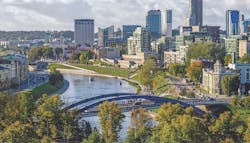There’s an interesting anecdote about Lithuania that is often shared among basketball aficionados.
During the time the Soviet Union occupied Lithuania, the U.S.S.R.’s national basketball team won golds in two Olympics, three FIBA World Cups, and 13 EuroBasket Championships — and players from Lithuania had a starring role in this dominance. But after the Republic of Lithuania restored its independence from the U.S.S.R. in March 1990, Lithuania found itself in need of some financial support to fund the basketball team’s trip to the 1992 Olympics.
The U.S. rock band The Grateful Dead — famed fans of freedom — decided to kick in some funds as well as provide the basketball team with the band’s iconic style tie-dyed shirts, designed in Lithuania’s national colors. The shirts became wildly sought-after Olympic souvenirs, and sales raised money for basketball and other Lithuanian charities.* But more importantly, the Lithuanian national team beat Russia to take home the bronze — reminding the world that the small country of Lithuania was determined to come up big on the boards.
As Lithuanian basketball approaches its centenary, hoops aren’t the only thing hitting a milestone anniversary. This year, the country is celebrating 50 years since the start of its biotechnology industry.
The Vilnius, Lithuania enzyme manufacturing factory — one of five facilities built by the Soviet Union’s government — began operating in 1971, and shortly after, a research center was opened in the factory. The research center became the foundation of the renowned Institute of Applied Enzymology in the Soviet Union. After Lithuania broke from the U.S.S.R., many of the scientists once working at the large institute stayed in Lithuania and set up spin-off companies that still exist today. The institute was renamed the Institute of Biotechnology and is now part of the Life Science Centre at Vilnius University.
It was this 1971 research and manufacturing facility that launched the Lithuanian biotech sector, which, after a temporary lull in the 90s, resumed its steady incline, with a particular focus on R&D of reagents and enzymes, as well as more broadly across the life sciences. Today, according to the Lithuanian Biotechnology Association, the biotechnology and life sciences sector is one of the most productive sectors of the country’s economy — and the fastest growing in the European Union.
Backed by a rich scientific heritage and ongoing government support, Lithuania’s dynamic pharma industry is hungry for an even bigger spot on the world stage.
*The shirts, featuring a slam-dunking skeleton, were designed by New York artist Greg Speirs. Even after the shirts were given to the players, sales continued and the artist donated the remaining profits to the team and Lithuanian children’s charities.
Full court press
Over the last two decades, the Lithuanian life sciences industry (which includes pharma, med-tech and biotech) has skyrocketed. According to Enterprise Lithuania, a nonprofit government agency focused on business development, the biotech and pharma sectors grew by 62% last year, stimulated by the pandemic.
“The whole world has seen the consequences that change can have on human health and the breakthrough that united science and business can achieve in their decision to solve a problem,” says Enterprise Lithuania’s Managing Director, Daina Kleponė. “The pandemic brought all private and public sector attention to this area, and last year it accounted for approximately 2.8% of Lithuania’s GDP.”
And the Lithuanian government is focused on making sure this momentum isn’t lost. Long-term investments in life sciences are seen as both a key part of the national strategy for economic recovery from COVID, as well as for future growth. Back in 2018, the government laid out a strategy to increase the GDP contribution of the life sciences industry to 5% by 2030.
According to Kleponė, it’s an ambitious, but attainable goal.
“Lithuania has a strong foundation in life sciences. We have famous scientists and enough talent and modern infrastructure. We’ve seen a sharp increase in the willingness to invest in life sciences startups, which is stimulating the birth of [many] businesses in this area. Last, but not least, our government’s economic promotion program provides special attention to this sector,” says Kleponė.
The government’s playbook
The Vilnius City Innovation Industrial Park is dedicated to companies that want to build research centers, labs or factories, as well as to business and science collaboration.
The Lithuanian government is backing its ambitious expectations with a strong set of financial incentives.
The Lithuanian parliament recently adopted a new package of laws, which came into force at the start of 2021. According to Invest Lithuania, the official government agency for foreign direct investment and business development, the new legislative package offers significant tax incentives and dramatically cuts red tape, making it quicker and easier for international businesses to establish and grow large-scale operations in Lithuania.
Specifically, large-scale projects (LSPs) that meet the requirements — spending 20 million euros in capital expenditures and creating 150 new full-time jobs — will enjoy 0% corporate income tax for up to 20 years. All LSPs will be given the status of “Project of State Importance” ensuring additional state support for territorial planning and environment assessment procedures. Other perks include: faster decision-making from public authorities, a streamlined immigration process for employees, and simplified project planning requirements.
There are also favorable tax incentives for investments into R&D, including triple deduction — meaning expenses incurred by companies while carrying out R&D can be deducted from taxable income three times. Additionally, investments into substantial technology improvements can entitle companies to reduce taxable profits by 50%.
At the recent Life Sciences Baltics event, panelist Karolina Karl, head of the Life Sciences team at Invest Lithuania, pointed out that the government is “hungry and eager to make sure companies that invest are successful.” Life sciences are high on the political agenda, and this brings advantages for companies in the sector.
“The government ensures that all decisions companies require are fast, and that all companies have [the] opportunity to get the most benefits the country can offer,” said Karl.
Attracting multinational investments
Several prominent multinational pharma companies are already taking advantage of the financial benefits and have a well-established presence in Lithuania. Two of the biggest and most successful life sciences companies currently in the country began as Lithuanian companies — and then were acquired by large multinationals.
Among them is the country’s largest pharma manufacturer, Teva Baltics. Israeli giant Teva Pharmaceutical Industries acquired the Lithuanian company, Sicor Biotech, in 2006 forming Teva Baltics. Since setting up in Lithuania, the company has continued to expand operational capabilities, investing more than $80 million, building new labs and installing new manufacturing lines. A number of new technologies have since been developed in Lithuania including Teva’s biosimilar to Amgen’s blockbuster cancer drug, Neupogen, which won FDA approval in 2012.
Another well-known multinational name in the country is Thermo Fisher Scientific. The U.S. company came to Lithuania in 2010, after acquiring Lithuanian biotech company Fermentas. Now, the Thermo Fisher Scientific Baltics site, located in Vilnius, boasts world-class capabilities in manufacturing molecular, protein, and cellular biology products, and has one of the largest private R&D centers in the Baltic region. Back in January, the company announced plans to open a new production building in Vilnius — a project that has already been completed — in order to produce more reagents for developers of vaccines and therapy products, including COVID-19 vaccines.
Karl attributes Lithuania’s attractiveness to international companies to the country’s business-friendly environment and good quality-to-cost ratio.
“Lithuania is constantly improving and adjusting the business environment to grant companies business opportunities, which allows them to maximize their investments,” said Karl.
Building a dream team
Two key strengths that are enabling Lithuania to continue to come out on top as a life sciences and biotech destination are the country’s talent and infrastructure.
The labor force in Lithuania is often described as young, skilled and enthusiastic. The country, with a population of just 2.8 million (roughly that of Chicago), boasts 15,000 scientists working on life sciences projects. Close to 600 life sciences companies call Lithuania home, employing over 7,500 people.
And the country is looking to keep growing this number through its educational infrastructure. There are six universities and seven colleges offering studies in life sciences fields. In 2016, Vilnius University, located in the country’s capital, opened a state-of-the-art Life Sciences Centre. The Centre offers education and training in life sciences, together with advanced research in biochemistry and related fields, providing world-class facilities for around 1,000 students. Enterprise Lithuania estimates that 23% of the country’s students are enrolled in programs related to life sciences.
This large talent pool combined with the solid life sciences infrastructure has contributed to a thriving startup scene, says Kleponė.
“Talented people can do a lot in a good infrastructure and make the discoveries that attract the attention of investors,” says Kleponė.
Investments in Lithuanian life sciences startups have been increasing. According to Invest Lithuania, there are currently more than 1,000 startups in Lithuania, and more than 60 of them are in life sciences.
The capital city of Vilnius in particular has been a hot spot for startups, driven by fintech companies. But life sciences isn’t far behind. Recently, Vilnius University’s Life Sciences Centre partnered with the Vilnius City Innovation Industrial Park, which has been operational since August 2018, to launch a specialized life sciences incubator in the park. The goal is to create an enabling environment for young, promising companies developing projects in the life sciences and related fields.
The incubator will be equipped with a GLP-compliant molecular biotechnology laboratory complex, specialized for work with microorganisms, viruses and bacteria, and a complex and open-access center focused on bioinformatics, a subdiscipline of biology and computer science focused on DNA and amino acid sequences.
As Lithuania pushes to grow its life sciences ecosystem, efforts like these that enable R&D and foster collaboration between innovative startups and mature investors will be key.
Already successful, yet still eager, the life sciences community in Lithuania has access to both support and resources — and that opens the door to a lot of opportunities for growth.
“The community plays a huge role — the network is tight and all the decisions are fast,” said Karl


